
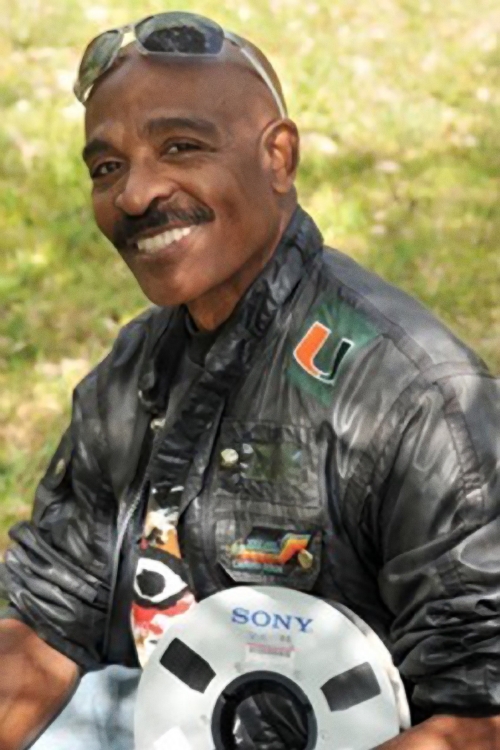
AND I’M ENJOYING THE HELL OUT OF THIS...
Dalton Narine
The steel band moment is here after all. And it might be hard to find the concept of the future in this arena of drums and notes. For now, the night needs answers. What will it take?
Will you give us your heart through the ear. What is the structure of the performance. What inspired it. Will the interpretation move us. Will it take us to another place. What does the band want to accomplish. Will it adjust tempo. Is that necessary. And for the adjudicators, why does a piece of music work and why it doesn’t. What are the technical shortcomings. What do you hear that we don’t.
We’ll find out tonight. And not a moment too soon.
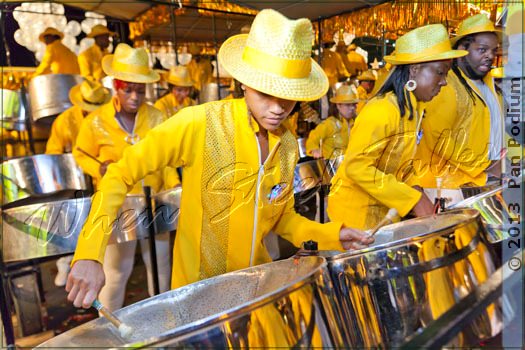
Trinidad All Stars at the 2013 Trinidad & Tobago National Panorama Finals
- photo: Robbie Joseph
When Trinidad All Stars members warmed up the knuckles before the countdown clanged like a metronome from pan’s frighteningly innermost insecurities about tempo, an icy sweat rolled slowly down the spine. This might be the band’s only shot. Leon “Smooth” Edwards’ only chance at joining Jit Samaroo and Clive Bradley as the trinity of the Panorama Divine, as the fundamentalists on the Drag and in the Grand and North Stands dearly ascribe its value (privileged as the audience is to pony up big dough so it could take in the matadorish spectacle). For, on different levels, we’ve not yet fully recognized our values in the instrument - or, put it this way, our appraisal of the values of the instrument is painfully impotent. Have we consciously awakened genius?
Yeah, man.
The late Franklyn Ollivierra casts a look toward long-time friend Len “Boogsie” Sharpe as he conducts Phase II Pan Groove.
Admiring the genius of “Boogsie” Sharpe. An arranger who, worn down by protest and tribute songs in the Panorama, was moved to venerate a fallen colleague in Ollivierra, a man who had served Sharpe and Phase II for three decades or so, someone who’d have taken a bullet for the friend he adored. The former Highlanders amplified tenor player during the band’s glory years, Ollivierra now receiving all the attributes of devotion in a love song, and in a fawning sense, fit for a king — Black Stalin the singer, with a few strokes of the pen creating his inimitable magic.
What Stalin spawned — so eternal and beyond compare — who’s to judge the national love-up everybody gets from his ballad, More Love.
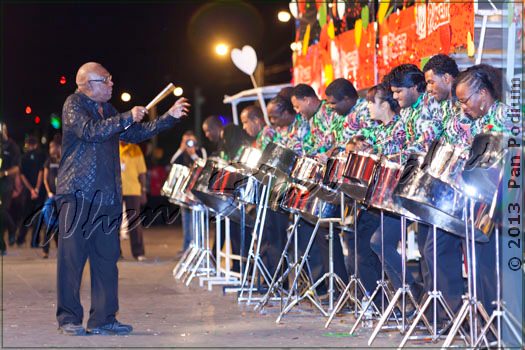
Arranger Len "Boogsie" Sharpe with Phase II Pan Groove at the 2013 Trinidad & Tobago National Panorama Finals
- photo: Robbie Joseph
Federico García Lorca, a Spanish poet, playwright and theater director in the 1920s-30s wrote, “The melody begins, an undulant, endless melody. [It] loses itself horizontally, escapes from our hands as we see it withdraw from us toward a point of common longing and perfect passion.” Such description captures the essence of Sharpe’s music.
Flowers bloom and die and bloom again. And thus was the Phase reborn Panorama Saturday night, swaddled in Sharpe’s labor of love - the beauty of the music inside, much like the interior of a European concert hall or the Vatican, especially the Vatican. The quadrophonics and four pans nestled within the heart of the orchestra while supplying the family tree with the nutrients for victory.
“It’s a big tenor pan,” says Sheldon Franklyn of the two pans up two down utility instrument, “even though it’s four pans. It keeps me busy. We follow the tenors, then the double tenors, the seconds, the four pans, even the basses sometimes. Wherever they go we follow. We play melody and harmony and some chords, if the arrangement calls for them.
“Sharpe knows what he’s doing. A passage we learned one night, he’ll tear it down the next and build a new one. It’s always like that. Down to the eve of final night. It’s a challenge but I like what he does and what I’m doing.”
When Sharpe speaks to the band, the message relates to expressing more love for each other, tenor player Keith Maynard says. “Franklyn was the epitome of that, even if he had to get up at 1 am [to help a friend in need].
“This song, the music is smooth and romantic. The lyrics, so powerful and instructive, really captured what is required of T&T (Trinidad & Tobago) today, required of us to succeed - the collective caring for each other and sharing with each other.”
From the get-go, Sharpe emphasized the phrase more love, more love, more love, making a statement right there in the intro.
“We have really good music, difficult to execute, and it requires extreme attention and focus,” Maynard, unfazed, said earlier in the day.
The band has been inspired by a certainty of confidence all week, and is up to the task, according to Natasha Joseph, the drill mistress and Sharpe’s assistant.
“We followed the judges’ criteria, reharmonizing through the song,” Joseph said. “[Sharpe] tried a lot of challenging stuff, like a passage that included a glissando - 13 notes in two beats at a tempo between 120-125 beats per minute. Two such passages like that; tenors, double tenors, double seconds and quads. He makes a statement that only he knows well. He passes on the music but not everybody remembers. And that’s where I come in. I redistribute the music.”
Joseph says Sharpe has so much music to give that none of it remains static.
Hear Joseph: “He can arrange ‘More Love’ in a week. He almost gave us a Panorama tune in a day. But players can’t handle the load. He gets in a flow and the music never stops. There’s nobody in the world like that.”
A steely but compassionate work of art, the song is as complex in its simplicity as it is overwrought in style. In the end, a key changes hands and eventually rinses into samba lines that cut in with a festive flair just before the coda arrives. It’s a throwback to your parents dancing, energizing the love the way Chee Mooke workers Joan Phillips and her adult son, Stokely, taking a break from the grind, carried the salsa across the floor with extemporaneous verve the other morning. The rhythmic ending, like the Latin moment in the bakery, falling away, languid, suspended in time. More love, indeed.
More props, too, go to Sharpe and his band of merry men, the final night graveyard performance having pushed them to exhaustion following a long, hard slog to the top. The mission to dislodge All Stars from their two-year hold on the spoils of pan had denied the historic Duke Street orchestra a vaunted hat-trick.
Sharpe entertained the audience with so much doo doo darling, it must have left him spent. Even in the recent Panorama, Hello didn’t answer his call. Some Phase II fans are seeking redemption, as in “Do Something for We.”
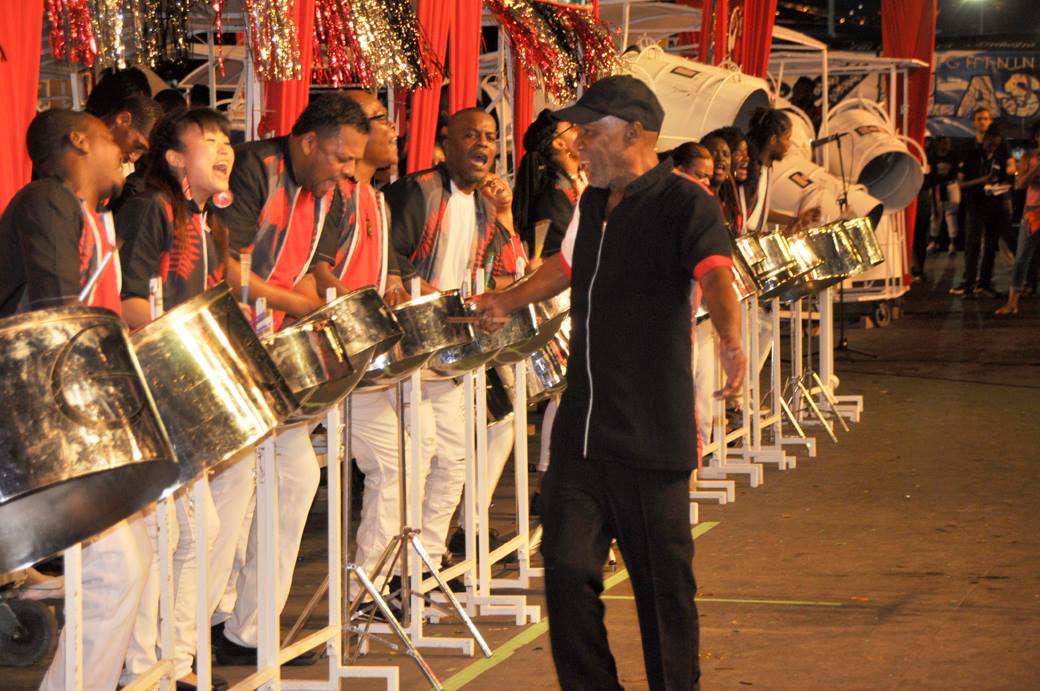
Phase II Pan Groove at the 2018 Trinidad & Tobago National Finals
- photo: Robbie Joseph
Panatics would relish his turning his back on OPMs (Other People’s Music) and facing his own music sooner than later. And it won’t be pleasant. Sharpe will need to run down his buddy, Smooth, with a piece of music more alluring than, say, Woman on the Bass, or Curry, whatever. Not only that, Duvone Stewart, the Brooklyn Three, Clive Zanda, Arddin Herbert and Liam Teague, they ain’t coming out to play.
They too hungry. Lotsa ‘splainin’ to explain.
Not no mo.
‘Cos, It is required of Len “Boogsie” Sharpe to do something for pan, the way he shoved his own message down Pan Trinbago’s throat in 2011. Do Something For Pan made for a fine opus that J'Ouvert morning. Revelers mouth-panned the arrangement as if Boogs were, well, not God, but the pan deity who one night would stop Leon Smooth Edwards in his tracks and rob the Stars of a hat trick just so.
And how would B Sharpe gift wrap it?
From your pal, Boogsie, More Love.
Wait till next year?
What you want to bet that 2019 won’t be as simple and easy as that?
See Panorama Finals Results - Large Steel Orchestras
Dalton Narine joined Trinidad All Stars as a teenage tenor panist in 1959. His father threatened to beat him up if he caught him playing the instrument, but Narine soldiered on and his dad gave in.
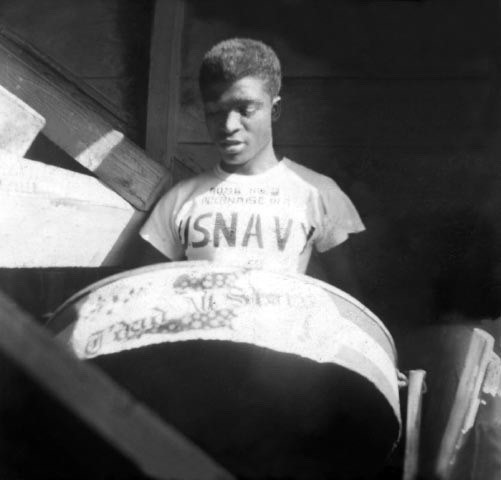
Dalton Narine joins Trinidad All Stars as a teenager, rehearses the Band’s 1959 Bomb, Intermezzo, in the garret of the Maple Leaf Club on Charlotte Street.

Dalton Narine watched a movie among friends and was harassed for watching the credits roll. He was 12. They laughed at his quip that someday his name would be scrolling like that on a movie screen somewhere. Little did they know it was a prescient warning.
A similar scene played when Narine stopped learning the piano and walked into a panyard. Nobody believed him until they saw him playing classical music on pan on J’Ouvert. Eventually Narine co-founded the iconic PAN magazine and became senior editor.
Narine, an award-winning writer for two newspapers and a magazine, started working on a novel. But the chair of Columbia University film school steered him toward a screenplay instead. Your story is a movie, the professor said. Today Narine is working on his final draft, with two more screenplays in his head.
contact Dalton Narine at: narain67@gmail.com


 When
Steel Talks shirts
When
Steel Talks shirts